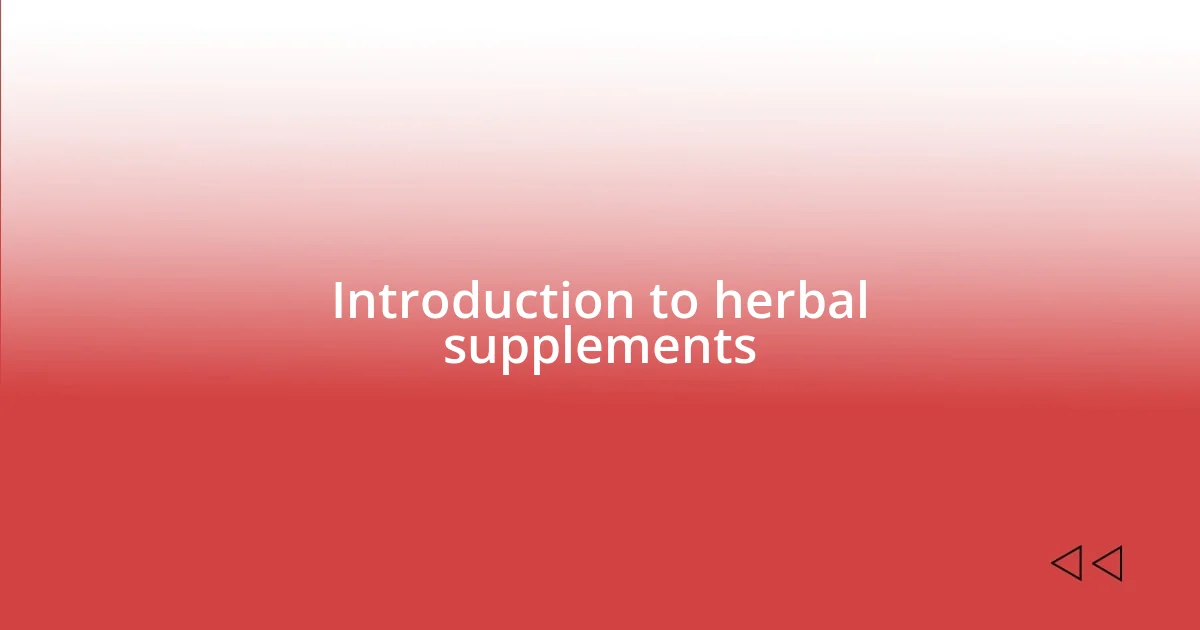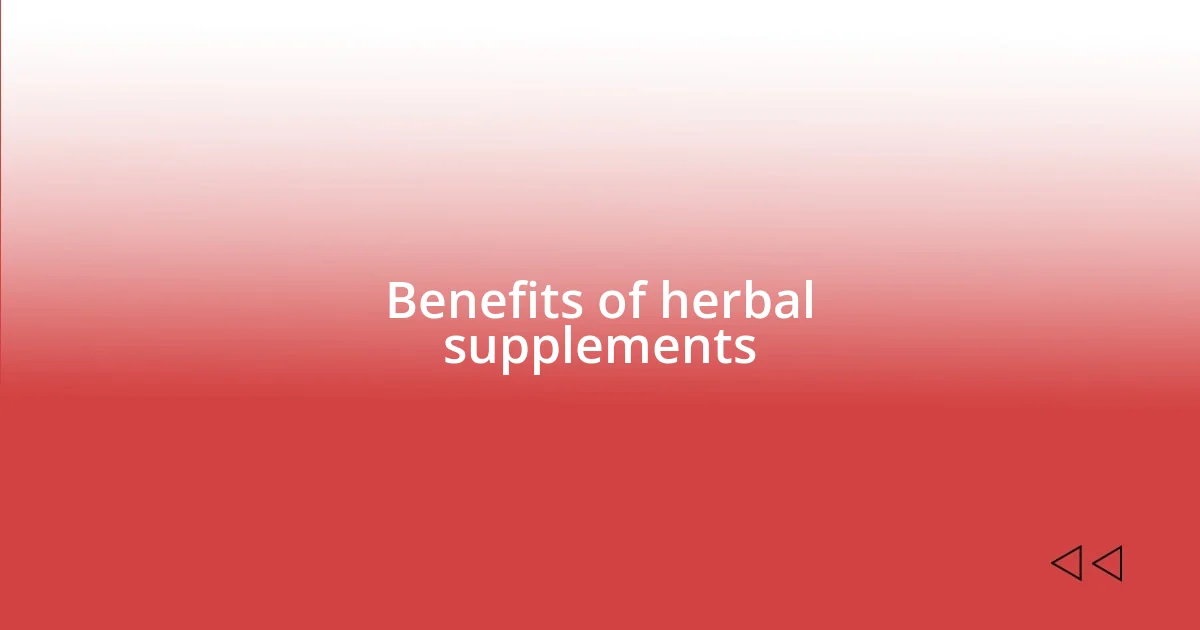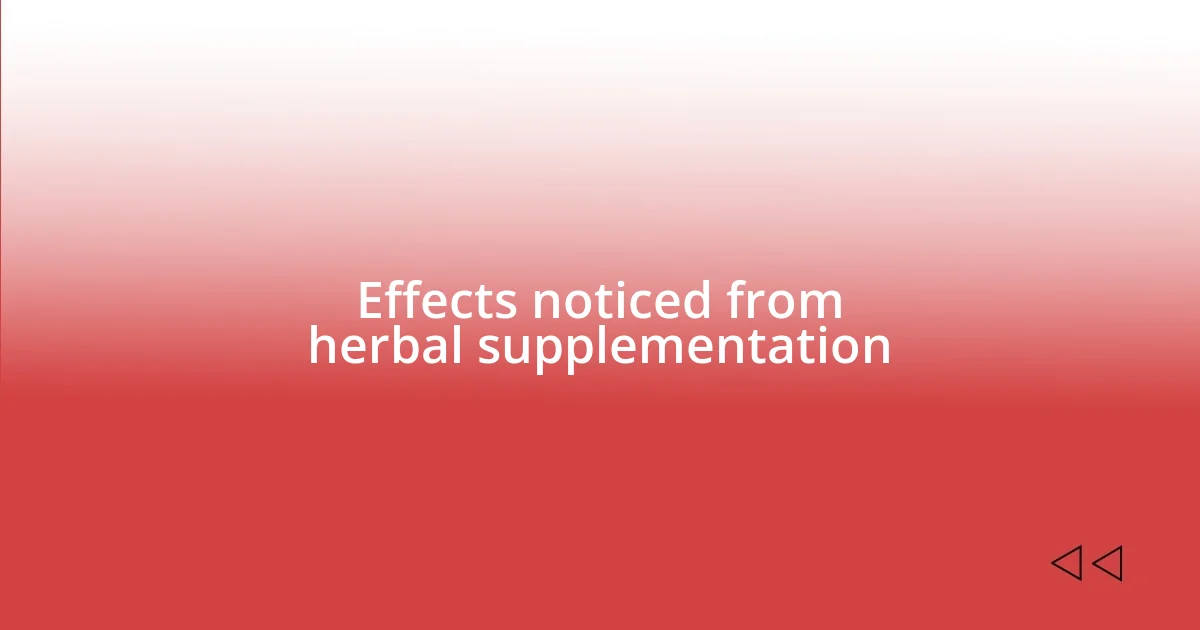Key takeaways:
- Herbal supplements have historical significance and can enhance wellness, as seen through personal experiences with various herbs like chamomile and ginger.
- Specific herbal supplements, such as ashwagandha, ginseng, and valerian root, provide tangible benefits for stress relief, energy, and improved sleep quality.
- Choosing the right herbal supplements requires a personal approach, emphasizing safety, research, and consulting professionals to align with individual health goals.

Introduction to herbal supplements
Herbal supplements have been a part of human wellness practices for centuries, attracting attention for their potential benefits. I remember the first time I tried an herbal remedy—chamomile tea—when I was feeling anxious before a big presentation. The warm brew didn’t just soothe my nerves; it made me curious about the power of nature’s offerings.
As I explored different supplements, I found myself asking questions like, “What makes these plant-based solutions so appealing in a world filled with pharmaceuticals?” The allure lies in their natural origins and the rich traditions behind them. Each herb carries stories and wisdom passed down through generations, allowing us to connect with nature in a profound way.
Many turn to herbal supplements seeking relief from health issues or to enhance their wellness routines. I recall experimenting with ginger for digestive support after overly rich holiday meals. The results were pleasantly surprising, and it sparked my journey into understanding the science and history that back these herbal choices. Have you ever wondered how ancient practices shape modern approaches to health? It’s fascinating to see how these time-honored remedies find new relevance today.

Benefits of herbal supplements
Herbal supplements offer a myriad of benefits, which can vary based on the specific herbs and individual needs. For instance, I often turn to ashwagandha when stress feels overwhelming. The calming effects it provides not only help in managing my anxiety but also enhance my general well-being. It’s incredible how just a small dose of this herb can shift my mood and focus.
One of the most remarkable aspects of herbal supplements is their ability to support various bodily functions. I remember a time when I felt sluggish due to a lack of energy. After incorporating ginseng into my daily routine, I noticed a significant boost. Instead of relying on coffee for that mid-afternoon slump, I found a natural alternative that worked wonders without the jitters.
The best part is that the benefits of these supplements often extend beyond physical health; they can enrich our emotional and mental well-being, too. I used to struggle with sleep disturbances. Once I started taking valerian root, my nights transformed. I felt a deeper, more restorative sleep, which, in turn, made my days brighter and more productive. The connections between these plants and our health are both profound and personal.
| Herbal Supplement | Benefits |
|---|---|
| Ashwagandha | Reduces stress and anxiety; promotes overall well-being |
| Ginseng | Increases energy levels and combats fatigue |
| Valerian Root | Improves sleep quality; enhances relaxation |

Choosing the right herbal supplements
Choosing the right herbal supplements can feel daunting, especially with so many options available. I’ve learned that the key is to listen to your body and start with what resonates most with your own wellness journey. For instance, when I faced persistent fatigue, I began incorporating rhodiola. The enhancement in my energy levels was noticeable, bringing a sense of vitality I hadn’t felt in a while.
To ensure you’re choosing the right herbal supplements for your needs, consider these helpful tips:
- Identify your primary health goals (e.g., stress relief, energy boost).
- Research the herbs that align with those goals and check their safety.
- Consult with a healthcare professional for personalized advice.
- Start with a low dosage to observe how your body reacts.
- Keep a journal to track your experiences and any changes noticed over time.
Taking this approach not only empowers you but also transforms the way you connect with herbal remedies. Each step leads to a deeper relationship with the plants that support your well-being.

Effects noticed from herbal supplementation
When I first started experimenting with herbal supplements, I was surprised by how quickly I felt the effects — both physically and emotionally. After a few days of taking turmeric, I noticed a reduction in joint discomfort that had nagged at me for years. It’s fascinating how nature can provide such relief, almost as if my body was saying “thank you.”
I remember feeling skeptical about how much herbal supplements could genuinely help. However, when I added passionflower to my evening routine, the calming embrace it provided was undeniable. Suddenly, my pre-bedtime racing thoughts quieted down. Have you ever felt those relentless thoughts at night? It was like having a gentle guide leading me into restful sleep, turning anxious nights into peaceful ones.
Another eye-opener for me was trying elderberry during cold season. Typically, I dreaded the constant sniffles and fatigue that came with it. This time, I decided to give elderberry a go, and to my surprise, I felt more resilient and less susceptible to those winter bugs. It really made me wonder, how many people dismiss herbal options without giving them a fair shot? This experience taught me to approach health holistically, blending nature’s gifts with modern understanding.

Conclusion and future considerations
The journey with herbal supplements has truly changed my perspective on personal wellness and has been an eye-opener. As I think about my future with these natural remedies, I’m excited yet cautious; it’s important to remember that not all herbal supplements work the same for everyone. What if today’s most effective remedy for me falls short tomorrow? Staying adaptable will be key.
I’ve discovered that integrating herbal supplements is about balance. I often wonder how much more I can explore — perhaps looking into lesser-known herbs or even experimenting with different forms, like teas or tinctures, to enhance their effects. With each addition, I find myself constantly evaluating and adjusting my approach, akin to a chef refining a recipe. This playful yet analytical mindset allows me to connect with my body more deeply.
Looking ahead, my hope is to share these insights with others who might be skeptical or unaware of herbal solutions. Isn’t it thrilling to think about the stories we could uncover together? By fostering a community focused on plant-based wellness, we could not only support one another but also learn from our varied experiences. After all, our individual journeys can illuminate a path for many as we navigate the world of herbal remedies together.















